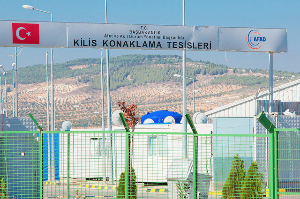The Syrian Refugees in Turkey Remain at the Mercy of the Turkish Government
By Halil Gürhanlı (vol. 7, no. 23 of the Turkey Analyst)
The Turkish government continues to refuse to grant Syrians who have taken shelter in Turkey refugee status in line with international principles. The Temporary Protection Directive, adopted on October 22, 2014, provides a comparatively more solid legal status for ‘temporarily protected’ Syrians, but it still falls short of granting the refugees their rights in legal terms. The new legislation effectively accords unlimited freedom to the government agencies to decide over the lives and future of two million Syrian refugees. This effectively means that the refugees will have to dance to the Turkish government’s tune if they wish to remain at a relatively safe distance from the horrors of civil war.

Turkey Moves Toward a Grand Bargain with Kurdistan
By Micha’el Tanchum (vol. 7, no. 19 of the Turkey Analyst)
On October 20, Turkey’s foreign minister Mevlut Çavuşoğlu announced that “Peshmerga” fighters from the Iraqi Kurdish Regional Government (KRG) are going to be allowed to transit Turkish territory to reinforce the beleaguered Kurdish forces of the Democratic Union Party (PYD) defending the Syrian Kurdish town of Kobane against the Islamic State of Iraq and al-Sham (ISIS.) The Turkish government had previously turned down requests for it to open a land corridor. Turkey’s policy u-turn means that it now has a unique opportunity to rehabilitate its failed Kurdish policy and arrive at a grand bargain to secure its national interests along its borders with Syria and Iraq. To create a more amenable constellation of Kurdish political allies, the Turkish government will need to offer a meaningful accommodation of Kurdish demands within Turkey.

What the Columnists Say
Several columnists express concern over Turkey’s future after the violent clashes in the Kurdish parts of the country and the government’s reaction to them. Cengiz Çandar writes that the leadership of the country has not learnt the right lessons and that it is mistaken in thinking that police state methods are going to save the day. Yetvart Danzikyan warns that the methods of the AKP government are inflaming ethnic and sectarian tensions and that the situation could get out of hand. Abdülkadir Selvi writes that Turkey is not going to give in to the pressures of the United States regarding the use of its bases in the fight against ISIS and reminds that Turkey demands that the Sunnis in Syria and Iraq are empowered and that the Assad regime in Syria is removed from power.

What the Columnists Say
The question whether or not and to what extent Turkey is going to participate in the fight against ISIS is at the center of the attention of the Turkish columnists after the release of the Turkish hostages held by ISIS. Abdülkadir Selvi in the leading pro-government daily Yeni Şafak writes that Turkey is never going to participate in operations “directed against the Islamic world.” Ali Bayramoğlu, also in Yeni Şafak, writes that Turkey is concerned that the fight against ISIS is going to bestow new legitimacy on Bashar al-Assad, and that the PKK is going to become empowered as a part of the coalition. Ergun Babahan on the t24 news site cites Kurdish news sources that claim that Turkey has been providing weapons and ammunition to ISIS forces that have laid siege on Kobane, and warns that the Kurds cannot be controlled by using the methods of the Cold War.

Turkey’s Water Policies Worry Downstream Neighbors
By John Daly (vol. 7, no. 16 of the Turkey Analyst)
As armed conflict ravages Syria and Iraq, Turkey risks adding to the social and political tensions to its south by cutting the water flow of the Euphrates, which originates in southeastern Turkey and is Western Asia’s longest river, to downstream states. Compounding Iraqi misery, the Islamic State (IS) has been using water as a weapon of war. As unrest continues to roil the Fertile Crescent, whether water is used as a tool of inconsiderate state policy or a weapon of war, the suffering of civilians and farmers has dire political consequences. What is certain is that Turkey’s ambitious GAP program is adding to the misery of the downstream populations.







